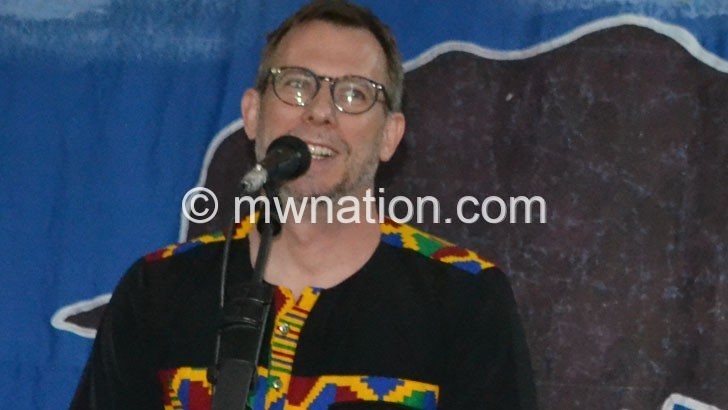Rick Deja talks Mw music
Rick Deja is a saxophonist of repute. The American is no strange name in Malawi music. His research on indigenous Malawi music is unparalleled. Currently, the acoustic guitarist, composer, educator and ethnomusicologist is based at the University of Cape Town, South Africa. In the 90s he worked with several Malawian musicians including Wambali Mkandawire, Erik Paliani and Nathaniel Chalamanda. That culminated into a world-acclaimed Afro-jazz album, Hometown Stranger. Not long ago, he released a solo work, the Itinerant Professor. Last week, he joined forces with Waliko Makhala and Snowden Ibu at the Jacaranda Cultural Centre’s Sounds of Malawi Acoustic Session. KONDWANI KAMIYALA caught up with him….

Q
: Welcome back to Malawi. What’s up?
A
: I am here for some time as I am about some personal stuff. It is always nice to be back in Malawi.
Q
: We saw you performing alongside Snowden Ibu and Waliko Makhala. How does it feel?
A
: Since I came to Malawi for the first time, in 1991, I have always played music with Waliko. I call him the Minister of Bush Music because he is passionate about indigenous music. As a matter of fact, we used to record and produce music together in a makeshift studio; the days of Deja Brew. One of the songs we did was Stonard Lungu’s Zapadziko, which we performed tonight. As for Snowden Ibu, he is what I call the Minister of Acoustic Guitar. He influenced me to try the acoustic guitar when I first met him in 2013. I have always used the acoustic guitar when I am composing songs. The saxophone, for me, is for conversation.
Q
: What is your word on Malawi music, as a ‘hometown stranger’?
A
: Foreigners look for music that is unique. It is a given fact that Malawian bands playing reggae would not attract the attention of the world. Malawi is very rich in music. The fusion of local and foreign elements could spice up things. Robert Fumulani, for instance, brought his own touch and he called it khunju reggae. Malawi’s musical richness is there for all to see. The melodies in your music are strongly linked to your languages. Malawi is so rich with musical traditions. It is essential to bring Malawi music on top and expand it.
Q: What has changed since you were here for the first time?
A
: The roads are still bad (Laughs). On a serious note, Malawi music is making strides. Right now, you have institutions teaching music, which was never there before. You have the Music Crossroads, Lusubiro Academy and the Malawi University of Science and Technology (Must) has a music department. This is a proper direction. Some time back, I did a workshop for first and second year music students at Must. It is in its infancy, but I see a lot of potential. I hope it will be realised to the fullest.
Q
: We have seen the mushrooming of music festivals in Malawi…
A
: Oh yeah. That as well is a good development. You have the likes of the Lake of Stars, Sand Music Festival and Lilongwe Jazzz Festival, among others. Music festivals offer great opportunities to get artists from different backgrounds together and perform. Not everyone would want to go to a bar to hear music, that is where festivals come in. It is an opportunity to expose the variety of Malawi music at all levels.
Q
: You play the saxophone, a difficult instrument, I must say. What is your comment on Malawian saxophonists?
A
: In 1990 or thereabouts I knew only three saxophonists. There was Bright Nkhata, Wyndham Chechamba and Dan Sibale. Today, things have changed and there are more and more saxophonists. Just tonight, you saw Emmanuel Gonthako joining us on stage with a sax. We are making headway.
Q
: Any future plans?
A : Yes, I would really love to work on a showcase with Malawi’s acoustic maestros like the Namakhwa Brothers, Giddes Chalamanda and of course Waliko and Snowden. I would love to see us doing a video presentation of an acoustic afro-beat showcase with them. It is just great playing with these great artists. I also plan to shoot a documentary with one of the local TV stations.





